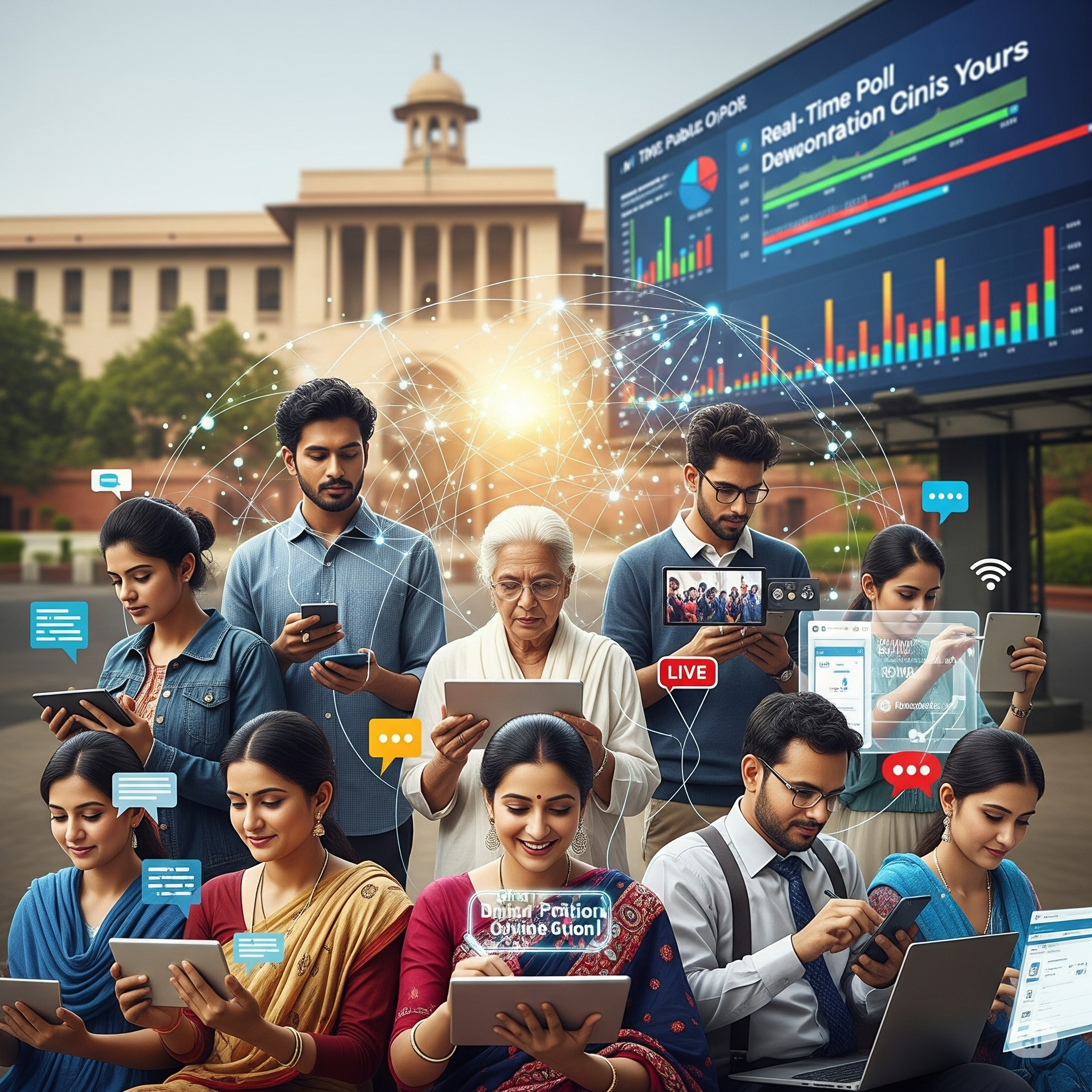
The Role of Technology in Shaping India’s Democratic Discourse Revolutionizing civic engagement and governance in the digital age.
- admin
- August 6, 2025
- Development, Technology
- 0 Comments
Introduction
Technology has become a cornerstone of modern democracy, reshaping how citizens engage with governance and how governments respond to public needs. In India, the integration of digital tools into democratic processes has significantly expanded access, enhanced transparency, and fostered accountability. From leveraging social media for public discourse to implementing e-governance solutions, technology has amplified democratic participation in the world’s largest democracy. However, it also brings challenges such as misinformation and digital inequality that must be addressed to safeguard India’s democratic fabric.
How Technology Enhances Democratic Processes
1. Increased Citizen Participation
Technology has empowered millions of Indians to engage in democratic processes by providing platforms for communication, feedback, and activism.
- Social Media as a Democratic Tool:
Platforms like Twitter, Facebook, and Instagram have become spaces for citizens to voice opinions, discuss policies, and hold leaders accountable.- Impact: Over 658 million social media users in India actively participate in debates, campaigns, and movements.
(Source: Internet and Mobile Association of India (IAMAI))
- Online Petitions:
Websites like Change.org have facilitated digital activism, allowing citizens to mobilize support for causes ranging from environmental conservation to policy changes.
2. E-Governance Initiatives
Digital technologies have streamlined governance, improving the efficiency and accessibility of public services.
- Examples of E-Governance Projects:
- Digital India Mission: Aims to transform India into a digitally empowered society by providing online access to government services.
- Aadhaar-Linked Services: The world’s largest biometric ID system enables direct benefit transfers, ensuring transparency in welfare schemes.
- UMANG App: A unified platform providing access to over 1,200 government services across sectors like healthcare, education, and agriculture.
(Source: Digital India)
3. Strengthening Electoral Processes
Technology has modernized India’s electoral system, ensuring free and fair elections.
- Electronic Voting Machines (EVMs):
Introduced in 1982, EVMs have streamlined voting and counting processes, reducing errors and enhancing efficiency. - Voter Awareness Campaigns:
The Election Commission of India uses digital platforms to run campaigns that encourage voter participation and educate citizens about their rights.
(Source: Election Commission of India)
Challenges of Technology in Democracy
1. Misinformation and Fake News
The rapid spread of misinformation through digital platforms poses significant risks to democratic discourse.
- Impact:
- Manipulation of public opinion during elections.
- Erosion of trust in democratic institutions.
2. Digital Divide
While technology has connected urban India, rural and underserved areas still face limited internet access and digital literacy, restricting their participation in digital democracy.
- Statistics:
- Only 37% of rural households in India have access to the internet compared to 67% in urban areas.
(Source: National Sample Survey Office (NSSO))
3. Privacy and Surveillance Concerns
The increased use of technology in governance raises concerns about data privacy and potential misuse for surveillance. Safeguarding citizens’ rights in a digital era remains a pressing issue.
Balancing Technology and Democracy
1. Promoting Digital Literacy
Enhancing digital literacy can bridge the gap between rural and urban India, ensuring equitable access to technology-driven governance.
- Initiatives:
- The Pradhan Mantri Gramin Digital Saksharta Abhiyan (PMGDISHA) aims to make 60 million rural households digitally literate.
(Source: Ministry of Electronics and IT)
2. Regulating Digital Platforms
Strengthening regulations on social media platforms and holding them accountable for content moderation can help curb misinformation.
3. Ensuring Data Privacy
Robust data protection laws, like the Personal Data Protection Bill, are essential to secure citizens’ information and build trust in digital governance.
(Source: Ministry of Electronics and IT)
Opinionated Yet Balanced Perspective
While technology has undeniably enhanced India’s democratic discourse, it must be wielded responsibly to mitigate its risks. Proactive policies, inclusive digital infrastructure, and citizen awareness are crucial to maximizing technology’s potential as a democratic enabler. Moreover, fostering collaboration between the government, private sector, and civil society will ensure that technological advancements align with democratic ideals.
Conclusion
Technology has revolutionized India’s democratic discourse by empowering citizens, streamlining governance, and enhancing transparency. However, addressing challenges like the digital divide and misinformation is imperative to ensure that these advancements benefit all sections of society. As India continues to innovate and embrace digital transformation, balancing technological progress with democratic integrity will be key to sustaining the world’s largest democracy.

